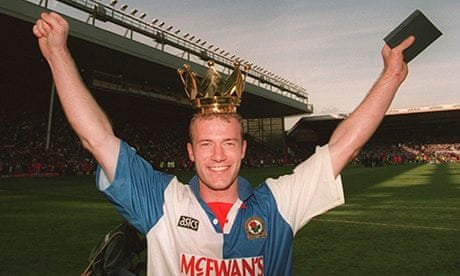Ask anyone to summarise how Blackburn managed to win their first League title for 81 years and they will undoubtedly recall Jack Walker's wealth, Alan Shearer's goals and his SAS partnership with Chris Sutton – probably in that order.
A quick internet search generates season reviews which invariably but frustratingly convey the message that "moneybags" Blackburn "bought their way to the title". While Rovers owe a huge debt of gratitude to their generous benefactor, which their fans continue to vociferously acknowledge, the emphasis on money is unjust and the assertion that they only won the league because of it is ignorant of the facts and holds no weight.
To win a league, a team must invest in playing staff. Rovers admittedly spent a considerable amount on their strike force, twice breaking the British transfer record and parting with £8.3 million, while also signing Tim Flowers in a record deal for a goalkeeper. However, in terms of financial outlay on the first team that won the league, that is just about it.
There is a mistaken assumption that the club also spent heavily on Graeme Le Saux, Colin Hendry and captain Tim Sherwood, perhaps because they became indispensable so quickly and were sold on for big profit. In fact, all three were acquired on the cheap: Hendry for £700,000, the same price the club sold him for two years earlier; Le Saux, who was out of favour at Chelsea, for around the same and Sherwood from Norwich City for a mere £400,000.
However, based on calculations of the reported transfer fees for the roughly first choice starting XIs of both clubs in the 1994-95 season (taking into account injuries and long-term suspension), Rovers spent far less than the incumbent champions, Manchester United. Peter Schmeichel, Denis Irwin, Steve Bruce, Gary Pallister, Andrei Kanchelskis, Paul Ince, Roy Keane, Ryan Giggs, Brian McClair, Mark Hughes and Andy Cole cost £19.33m.
Whereas Flowers, Henning Berg, Hendry, Ian Pearce, Le Saux, Stuart Ripley, Mark Atkins, Sherwood, Jason Wilcox, Shearer and Sutton set Rovers back a comparatively low £14.7m. Given that these squads – in particular United's – took years to assemble, perhaps a fairer assessment would be to look at the 1994-95 spend in isolation. Even on this basis, United's outlay exceeded their rivals'.
Comparisons with other clubs are also favourable. Blackburn's entire back four cost less than Newcastle paid for Darren Peacock and less than half of the sum required to bring Phil Babb and John Scales to Liverpool. In Carlton Palmer, Leeds United spent more on a single midfielder than Rovers did across their starting midfield four – illustrating that Rovers' spending was largely limited to their front two and not wasted unlike so many others.
How Blackburn happened to accidentally hoodwink so many into believing this "bought the league" fallacy is partly because of their wilful blindness to some of Kenny Dalglish's shrewd forays in the transfer market and abundance of unsung heroes. Take Atkins, for example. Signed from Scunthorpe United for £45,000 as a right-back, he filled in for the injured David Batty in central midfield and made 30 league appearances during the title-winning campaign, scoring six times – the well timed volley at home to Southampton being the pick of a number of sweet strikes.
Other astute additions to play major roles included Berg, who was a relatively unknown 23-year-old at the time of his move from Lillestrom for under half a million, and the largely forgotten Pearce, who had only made four senior appearances before he joined the club for £300,000 – both insignificant sums even then.
Also fundamental to Rovers' success was the organisation and desire instilled in the side and, pivotally, the width provided by Wilcox (who incidentally came through the ranks as a trainee) and Ripley. Despite lacking natural pace, they both had the knack of being able to create the half a yard required to deliver crosses into areas where Shearer and Sutton thrived, scoring 49 of Rovers' 80 league goals.
Rovers' rise was remarkable. Dalglish took over an unfashionable club lying in the bottom half of the old Second Division and won promotion to the new Premier League at his first attempt. The following two seasons saw the club finish fourth and then runners-up, before being crowned Champions of England.
It is not disputed that the club were able to offer substantial wages to attract players, but they bought wisely rather than overly and deserved nothing less than the success they achieved. It is a story that is unlikely to happen again and one that should be celebrated with respect and admiration, rather than viewed as the 1990's version of Roman Abramovich's Chelsea or present day Manchester City.
This is an article from our Guardian Sport Network
This article first appeared on When Saturday Comes

Comments (…)
Sign in or create your Guardian account to join the discussion